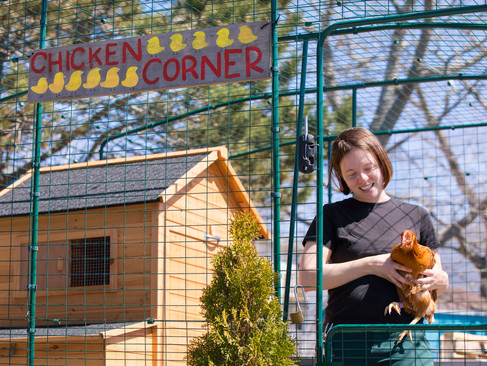About our chickens
- May 8, 2023
- 2 min read
Updated: Jun 15, 2023
In April, we welcomed our flock of chickens back to the farm! You may have noticed the flock has grown this year; we now have six feathery friends on the farm. We've created a list of the most frequently asked questions about our chickens.
What do they eat? Can I feed them?
They have a special hen food that looks a bit like cereal. It contains everything they need to keep them healthy. You can give them a couple of leaves or bugs as a special treat! Don't feed them other food, as they will stop laying eggs if they fill up on food that doesn't have the right amount of protein.

How many eggs do they lay per day?
Each of our laying hens lay about one egg per day. Sometimes they lay less if they aren't getting enough protein in their diet.
Are they safe from predators?
Their coop is completely predator-proof when closed up for the night. Common predators for urban chickens are raccoons, minks, dogs, and cats, but they can't get in!

Why don't these eggs need to go in the fridge?

On the outside of eggs, there is a delicate membrane called the "bloom" that keeps out bacteria. In some parts of the world, this bloom is kept on which makes eggs safer to store at room temperature and last longer. In North American eggs are scrubbed before going to the grocery store which takes off the bloom, so they need to be kept in the fridge!
Do they have enough food and water?
Yes! They have lots of water. As for food, if they finish all their food for the day, they are okay to wait for up to 48 hours before they get a food refill. We have people checking on the chickens every day.

Is one of them a rooster?
No, they are all hens. It is a myth that chickens need a rooster to lay eggs. They only need the rooster for the eggs to be fertilized and hatch into baby chicks. These eggs are unfertilized and only grow up to be breakfast!
Why are the chickens lying in the dirt?
Hens take dust baths! You might see them sitting in the dirt, or rolling around in it. Dust baths are important to keep parasites at bay and to clean the feathers. The process helps to control parasites and prevents the feathers from becoming too oily.
Where are your chickens from?
Our hens are rental hens, which we get from a family business called Hire-a-Hen. At the end of October, they will go back to their winter home with Hire-a-Hen in rural Nova Scotia. In the Spring they come back to us!
What are the chickens' names? And how did they get them?
Our chickens are named Chickpea, Hen Solo, Princess Laya, Toni Mancini, Chickira and Eggatha.
We had a name competition! Community members got to vote and the favourite names won. Their names are listed on the front of the chicken house, and are colour coded to match each hen's bracelet.






Comments